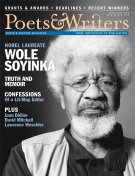In case anyone was wondering why all of those posters for Small Press Month (which, by the way, was March, so be sure to mark your 2007 calendars) featured Kurt Vonnegut's self-portrait, accompanied by his lines "You have to have somebody to write for. You can't just open the window and make love to the world," the answer lies in the sales figures for his most recent book. At the time of this writing, more than 136,000 copies of A Man Without a Country had been sold since it was released last September by—nope, not Random House, nor Penguin, nor Simon & Schuster—independent publisher Seven Stories Press (www.sevenstories.com). It seems the Small Press Center (www.smallpress.org) and PMA, the Independent Book Publishers Association (www.pma-online.org), cofounders of the annual celebration of indie publishers, finally found their poster boy—literally.
For more than thirty years, Olivia Dresher has been sifting through diaries, journals, notebooks, letters, aphorisms, and other literary short forms. Because sometimes less is more. But it is only during the last four years, since she founded the Seattle-based Impassio Press (www.impassio.com) in 2002, that she has had her own press dedicated to publishing examples of this kind of fragmentary writing, or frag lit—a term sorely lacking the mellifluousness of that other, slightly more commercially successful genre that is typified by a diary (Bridget Jones's Diary). Which, come to think of it, is probably just fine with Dresher and other frag-lit lovers. This month, Impassio Press will publish its sixth title—In Pieces, an anthology that features literary nuggets from thirty-seven contemporary writers, including aphorisms by William Stafford ("I hear the clock's little teeth gnawing at time") and fragments from notebooks by Matt Hetherington ("Brevity: because I can't bear myself very long"). In her introduction to the collection, Dresher writes, "I have yet to discover a precise definition of the fragment, though my own evolving definition…tends to be wide. It is my feeling that the fragmentary form, more than any other form, gives writers the opportunity to travel as far away from the boundaries of traditional genres as they feel they must in order to express their truths." And that can be pretty far. As the eighteenth-century German poet Christoph Martin Wieland wrote, "Truth doesn't reveal herself completely to anyone; everyone sees her in pieces."
BOA Editions, Ltd. (www.boaeditions.org), has been dedicated exclusively to the work of poets since it was founded by the late A. Poulin Jr. in 1976. But earlier this year, the nonprofit press's thirtieth anniversary, BOA unveiled plans to publish literary fiction. In 2007 the press will begin publishing the genre in its American Reader Series-a list that is currently composed entirely of prose written by poets, including After-Images: Autobiographical Sketches by W.D. Snodgrass, Pig Notes & Other Dumb Music: Prose on Poetry by William Heyen, and the forthcoming Breaking the Alabaster Jar: Conversations With Li-Young Lee, edited by Earl G. Ingersoll. "In adding fiction titles to BOA's publishing mission, we have also added a new step to the acquisition process-negotiating with agents," says Peter Conners, BOA's marketing director and newly named fiction editor. "We welcome unagented submissions, but this step will occasionally come into play in getting the books that we want." In other news from BOA, the press recently named its new executive director, Nora A. Jones. No, she isn't the singer-songwriter who won the 2003 Grammy Award for album of the year for Come Away With Me. BOA's Jones is a former editor of the Daily Record, a business newspaper in Rochester, New York, where the press is located.
Kevin Larimer is the senior editor of Poets & Writers Magazine.








